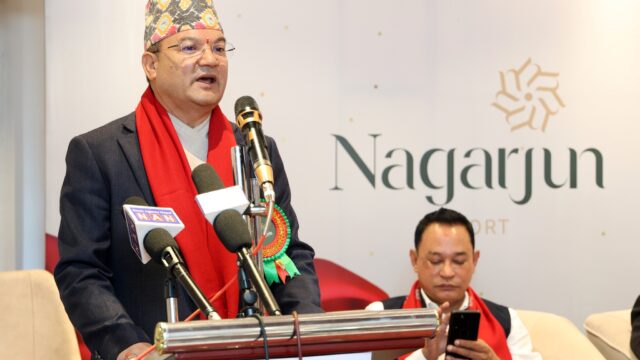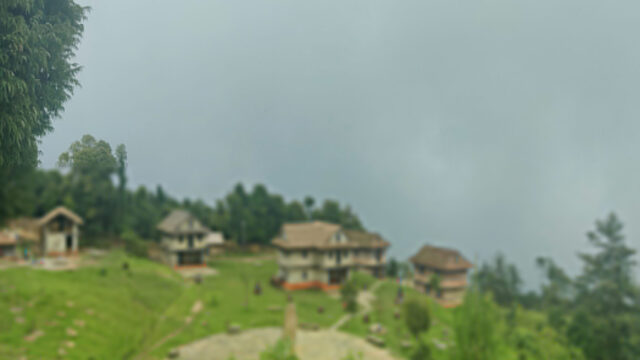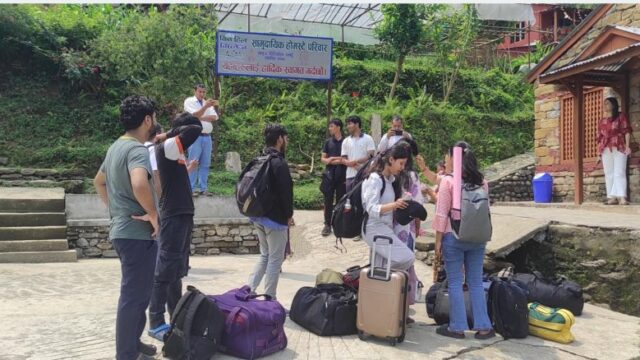The Restaurant and Bar Association (REBAN) Pokhara, established in 1999, advocates for the local hospitality industry by promoting collaboration, offering networking and skill development, and setting hygiene and safety standards. It actively enhances tourism through events that highlight Pokhara’s culinary and cultural heritage while addressing industry challenges. Over 24 years, REBAN has grown into a respected voice in hospitality, currently representing 88 member restaurants and bars, and is committed to creating a vibrant culinary scene that attracts food lovers and tourists to the city.
We recently had the opportunity to interview Mr. Bishwo Raj Paudel, the president of REBAN (Restaurant and Bar Association of Nepal), about the current state of the restaurant and bar industry in Pokhara, especially in the aftermath of the pandemic. Mr. Paudel provided valuable insights into the challenges and opportunities that the sector is facing, as well as the initiatives being undertaken by REBAN to enhance tourism through this vital industry.
What is the current state of the restaurant and bar industry in Pokhara, especially after the pandemic?
The restaurant and bar industry in Pokhara is gradually recovering from the significant impacts of the COVID-19 pandemic. Many establishments faced severe operational challenges during lockdowns, leading to a temporary decline in business. However, as tourism resumes, there is a renewed sense of optimism. Local restaurants, including iconic establishments of Restaurants, have begun adapting by enhancing their services, diversifying their menus, and implementing robust health and safety measures to reassure guests. Mr. Paudel noted that while some establishments are struggling to regain their footing, the overall sentiment is positive as tourist numbers slowly increase.
How does REBAN contribute to promoting tourism through the restaurant and bar sector in Pokhara?
REBAN plays a pivotal role in promoting tourism through various initiatives focused on enhancing the dining experience for visitors. By providing a platform for collaboration among restaurants and bars, REBAN helps its members share best practices, improve service quality, and promote local cuisines. The association organizes culinary festivals and events to showcase local flavors, drawing both domestic and international tourists. As highlighted by Mr. Paudel, these efforts not only enhance the visibility of individual restaurants but also contribute to the overall appeal of Pokhara as a culinary destination.
What are the major challenges that restaurants and bars in Pokhara are currently facing?
Despite the recovery, restaurants and bars in Pokhara face several challenges. One significant issue is the increased competition as new establishments enter the market, which can lead to price wars and compromise quality. Additionally, many restaurants are struggling with supply chain disruptions, which affect the availability of key ingredients. Mr. Paudel pointed out that attracting and retaining skilled staff remains another hurdle, especially as international tourism ramps up and hospitality jobs become more competitive. Finally, the ongoing need to adapt to changing health regulations continues to create operational challenges for many businesses.
How is REBAN working with the local government to improve the hospitality sector in the city?
REBAN collaborates closely with local government bodies to advocate for policies that benefit the hospitality sector. This partnership focuses on improving infrastructure, enhancing safety regulations, and providing training programs for hospitality workers. Mr. Paudel emphasized the importance of this relationship, as it helps align the goals of the local government with the needs of restaurant and bar owners, creating a more favorable environment for both businesses and tourists. By working together, they aim to promote Pokhara as a premier travel destination.
What role do local festivals and events play in boosting the restaurant and bar business in Pokhara?
Local festivals and events are crucial in enhancing the restaurant and bar business in Pokhara. These occasions attract tourists and locals alike, providing an excellent opportunity for restaurants to showcase their offerings. Mr. Paudel noted that the Restaurant has become a hub for cultural festivities, hosting various programs that highlight the rich diversity of the community. These events not only enhance the dining experience but also contribute to the overall vibrancy of Pokhara, making it a more appealing destination for visitors.
Can you share some of REBAN’s upcoming plans or initiatives aimed at enhancing the dining experience for tourists?
REBAN has exciting plans to further enhance the dining experience for tourists. One of the key initiatives is the organization of special events and culinary festivals that coincide with major holidays and celebrations. The REBAN is planning to host special events from December 28 to January 1, celebrating the New Year with unique cultural programs and a diverse menu featuring both local and international dishes. Additionally, REBAN is focused on improving training for restaurant staff to elevate service standards, ensuring that visitors receive a memorable dining experience.
How important is the use of local produce and traditional Nepali cuisine in Pokhara’s restaurant industry?
The use of local produce and traditional Nepali cuisine is vital for the restaurant industry in Pokhara. As highlighted by Mr. Paudel, incorporating local ingredients not only supports the local economy but also enhances the authenticity of the dining experience for tourists. Restaurants are committed to using organic and locally sourced ingredients, ensuring freshness and quality in their dishes. This emphasis on traditional cuisine also helps promote Nepali culture and heritage, making it an integral part of the dining experience.
How is REBAN addressing sustainability and eco-friendly practices within the restaurant and bar industry?
REBAN is actively promoting sustainability and eco-friendly practices within the restaurant and bar industry. Mr. Paudel mentioned that many REBAN members are adopting measures to reduce waste, utilize eco-friendly packaging, and implement energy-efficient practices. By encouraging restaurants to support local farmers and use organic produce, REBAN aims to foster a culture of sustainable tourism that benefits both the environment and the community.
What steps is REBAN taking to ensure safety and hygiene standards in restaurants and bars in Pokhara?
In response to the pandemic, REBAN has prioritized safety and hygiene standards across the restaurant and bar industry. This includes regular training sessions for staff on hygiene protocols and best practices for food safety. Mr. Paudel highlighted the importance of maintaining high standards to reassure both locals and tourists. Regular inspections and compliance checks are conducted to ensure that all establishments meet the necessary health regulations, creating a safe dining environment for everyone.
How do you see the future of Pokhara’s restaurant and bar industry evolving over the next 5 years?
Looking ahead, Mr. Paudel is optimistic about the future of Pokhara’s restaurant and bar industry. He envisions a more diverse and vibrant dining scene as new establishments emerge, each offering unique culinary experiences. With a growing emphasis on sustainability and quality, the industry is expected to attract more international tourists seeking authentic dining experiences. REBAN’s ongoing efforts to collaborate with local government and enhance service standards will play a crucial role in positioning Pokhara as a premier culinary destination in Nepal. Overall, the future looks promising as the industry adapts to changing trends and consumer preferences.
The restaurant and bar industry in Pokhara is on a path of recovery and growth, supported by the dedicated efforts of organizations like REBAN and its commitment to enhancing the overall dining experience for both locals and tourists.






